An interview with Claus-Peter Röh, Co-Leader of the General Anthroposophical Section at the Goetheanum, about inner culture.
Do you remember your first personal experience of meditation?
I was a student at university, where I attended a self-awareness seminar offered by the university. The exercises, which were simple from today’s point of view, were new and strange to me — for example inner stillness, reflection on something in the past and something in the future. I never forgot that first task because strong images presented themselves to me inwardly. “Tell me, do you actually meditate?” a student friend asked me who was involved with Transcendental Meditation, which was spreading at the time. I listened to him with interest, but it still remained somewhat foreign to me.
How do concentration, immersion, contemplation, prayer and meditation differ?
It starts with concentration, or as we often say today, mindfulness. I start to collect myself, to focus my attention amidst the abundance of events. I would call that concentration as a part of meditation, or a tool of meditation. You tune your inner instrument. That is not yet the content of meditation, but it leads towards it. It helps you let go of everything that swirls around you as sensory experience. What happens next is the change of direction from something external to what is internal. How does the concept of ‘light’, for example, act on me? It is a concept that I perceive externally and experience internally. Now I start to look within: What do I experience when I become mindful in this way? I observe myself. Dwelling in this, that is what leads you into the meditation. When the content I focus on inwardly begins a life of its own, then I am in the meditation. There is a contradiction here: I am active, and at the same time I allow the content to live. I allow it its own life.
Does this mean that your own will is silent and engaged at the same time?
Indeed, that is a wonderful question. This first step towards concentration is a real step of will. If I don’t actually take that step — this is a matter of to be or not to be — then I remain in my concepts, in my wishes. When I talk about meditation, many people tell me that they actually want to meditate but don’t reach the point we are talking about here. How do you get to this point, and what does the will measure itself against here? What makes the difference in this respect is the question of whether I stay outside, watching myself, or whether I get fully involved, taking hold of the subject in its fullness.
So it’s about an internally evident experience?
Yes, you feel that you are in a stream. In doing so, I would see the goal as staying awake in this stream and not simply surrendering to it. When you meditate on a verse, it can, after all, easily happen that you just reel it off without noticing. Here it is about being involved yourself, creating it step by step, and also noticing how the verse changes in the process, coming alive, and how you yourself begin to move. A change occurs from your own volition to a will that comes to meet you.
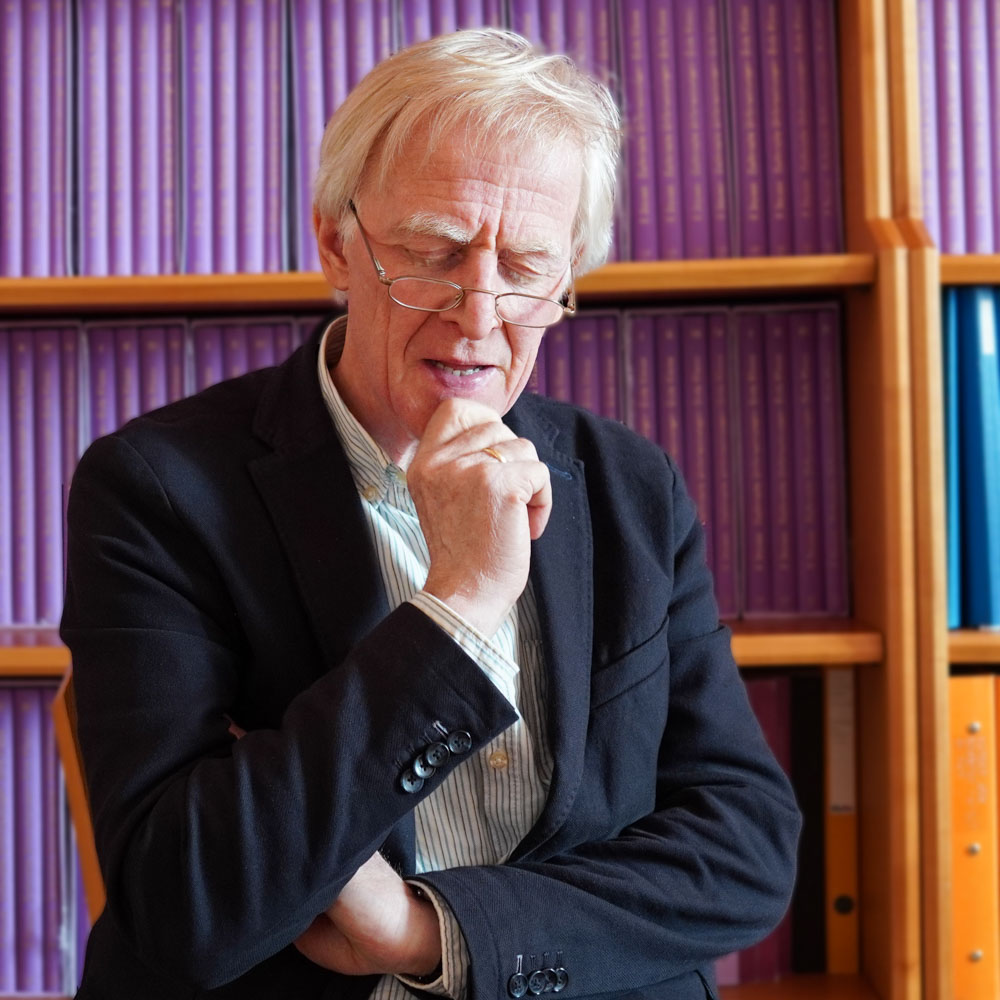
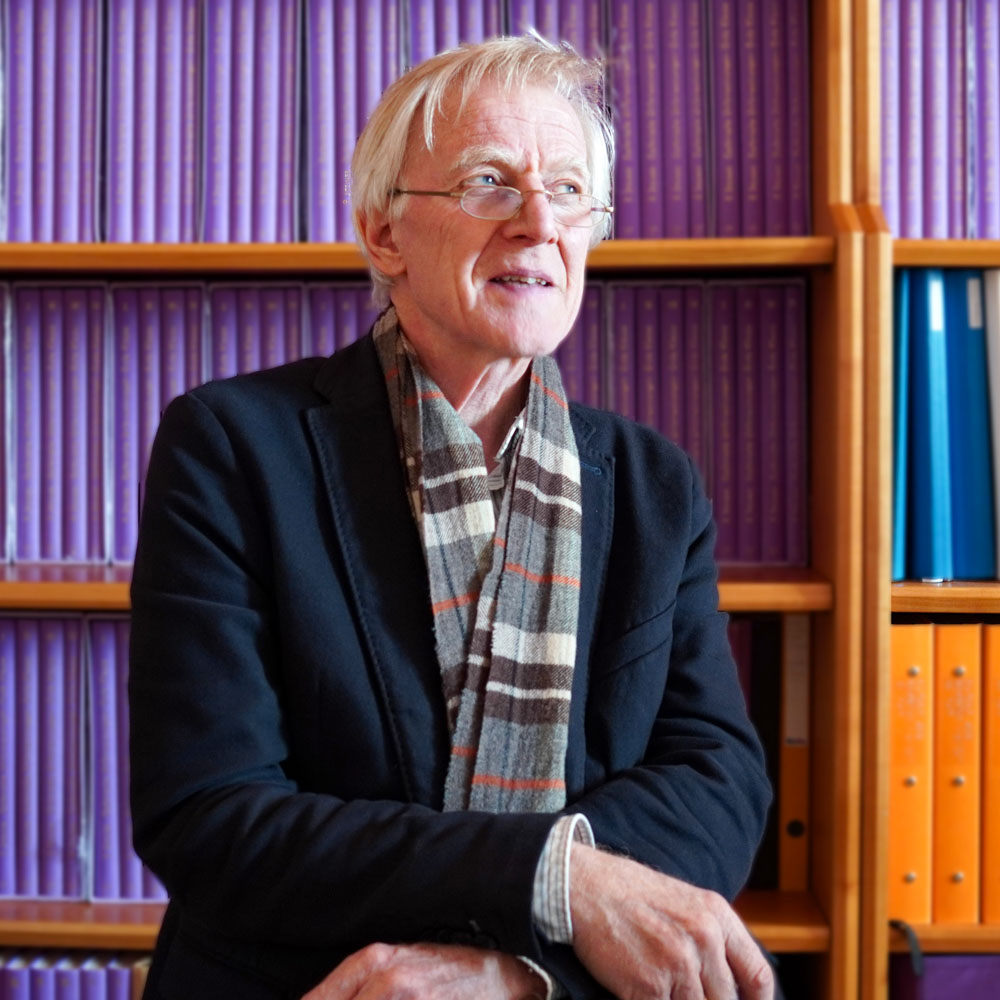
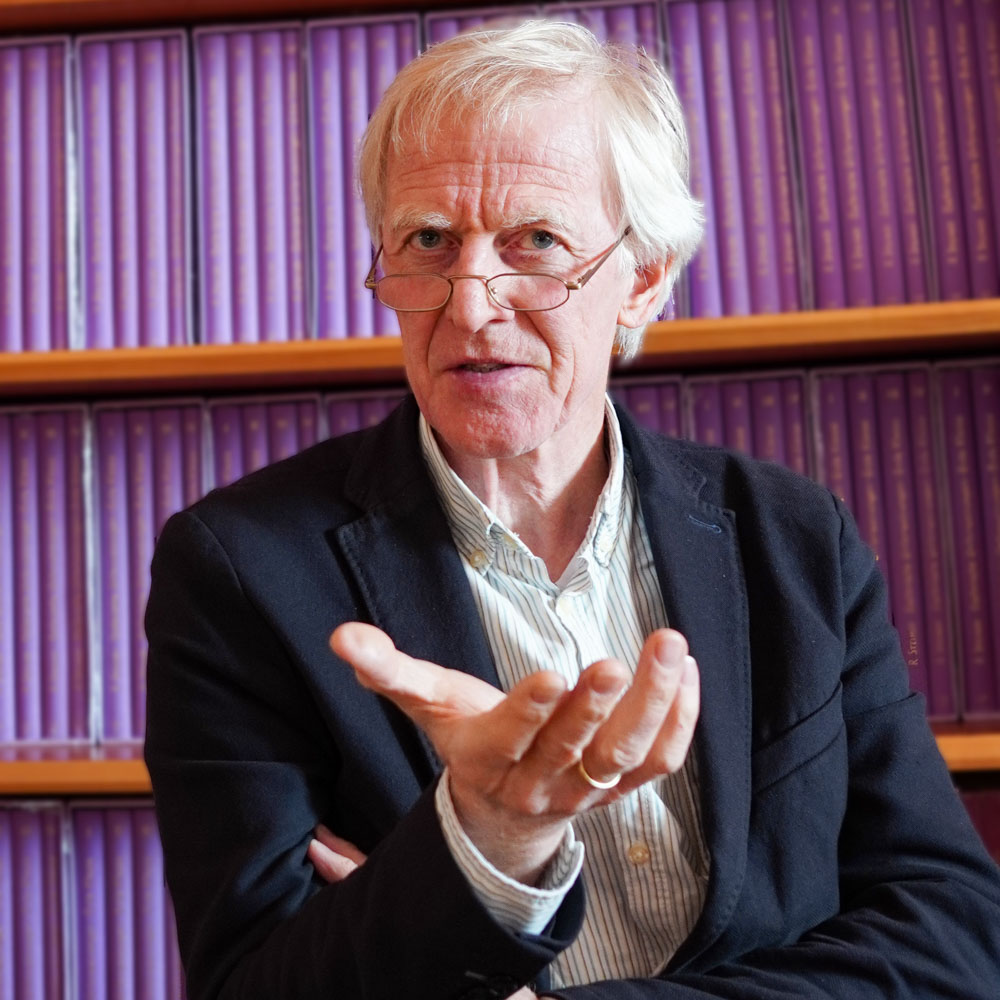
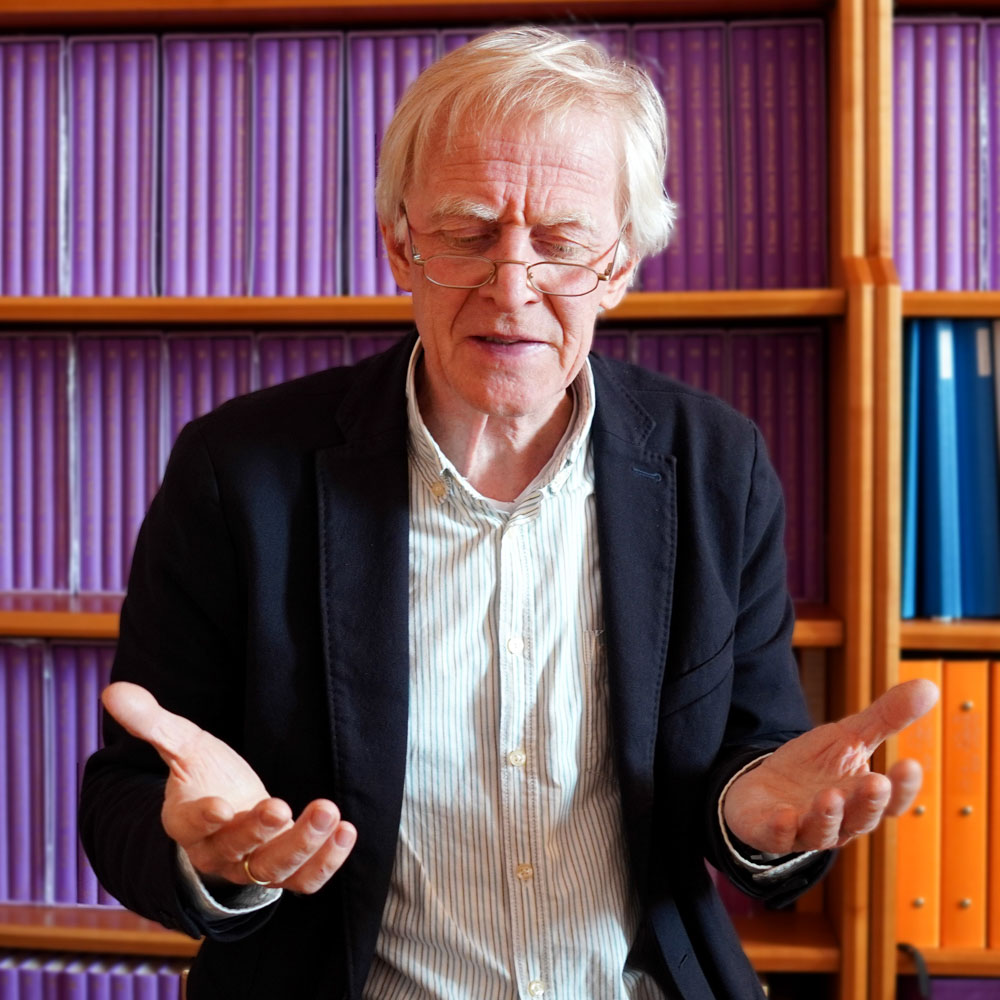
Claus-Peter Röh in conversation. Photo: W. Held
Isn’t it the same in the meeting between us humans? I strive to bring my own will into harmony with the will of others.
Yes, that is absolutely so. This is my impression, especially in the social sphere, where it is often also about this experience, how our own will and the will around us come together, and how this does not result in a compromise, where both sides with their will lose something, but rather in a gain. In the process, I observe that I learn in the echo what is really wanted or what is really being asked. I then ask, “What do you really mean now?” Is it possible to develop a more subtle sense for these echoes? This was crucial in my work as a teacher. You walk out of class after a lesson and quietly ask yourself, what actually happened? That’s when such an inner voice makes itself heard. I probably felt it in the moment, but it didn’t become conscious. The echo helps you to look at it once more.
You often travel to give courses on meditation. What questions do you encounter?
How do I enter into a real experience of this meditation? I have chosen a lovely verse, I am concentrating, but I remain uninvolved, a spectator. Here, I think, Heinz’s advice helps: first approach the whole thing in your thinking, try to understand what it is that is being talked about. If you repeat this, you arrive at a different flavour of the thing: understanding it not from the head but from the heart. What lives here? How does it taste? How does it sound? Where is it headed? This leads into the third stage of deepening the content such that it takes on a life of its own.
A second question is: When a picture arises in meditation, is it really that? How do I actually know that? There again it is about letting life speak, trusting the feeling as to whether it is relevant or not.
In guided meditations on the internet there is much talk of affirmations such as: “I am a cosmic being!” In anthroposophical meditation, you have to laboriously work your way towards such a conception.
A key point of anthroposophical meditation is indeed that I do not go someplace else in my thinking or feeling but that I take steps from my here and now, within myself. I don’t leap, I walk!
The day before yesterday, in a seminar, someone said that he began meditation by asking how he himself was doing. How am I in myself? So, the next step would then be to perceive this ‘how’ of your own soul, where you stand, and then to take a step and direct yourself towards something. So I go towards a thing, I do not summon it. I myself create the basis for an encounter. Then there is the turning point where I need the openness to let the other speak, to be able to hear, to want to hear the other side.
Is this also the change from the eye to the ear?
Exactly: from the focus of the eye to the awareness of the ear. There is an uncertainty, something that Rudolf Steiner describes in the Mystery Dramas. Maria and Johannes live through these moments in which they encounter something they do not understand, something that is new and unknown. They cannot understand it out of the old consciousness; the future in them is calling. This requires openness and the courage to permit it.
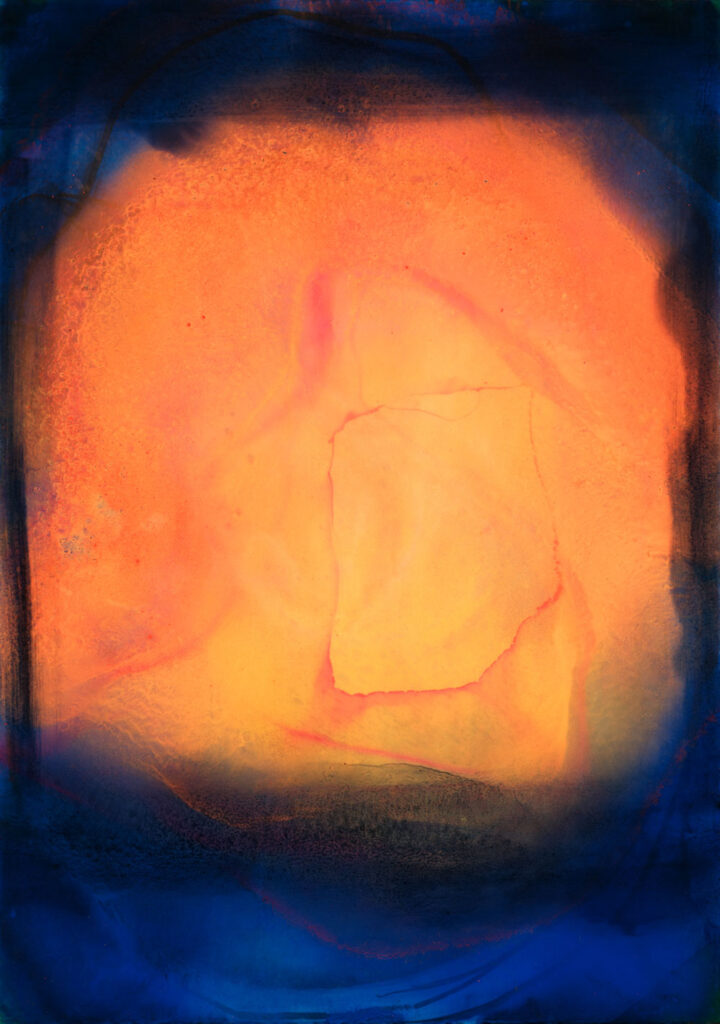
You have an overview over a long period of time. How has meditation changed?
We had three phases here at the Goetheanum. With initiatives like Living Connections, we publicized the anthroposophical tools for meditation and provided assistance in learning to deal with questions of destiny.
Then we shared methods of meditation. Which path do I want to take and which do I not want to take? Now we are actually still in a new phase: if we were to issue invitations to a colloquium now, then we would have to say: How do I experience the effectiveness of such meditation in life? How does my inner life resonate with my occupation? How does it change my life? I think the question of effectiveness is topical now, especially for younger people.
What, then, does meditation accomplish?
It enriches your thought life. It is precisely in moments of calm that new thoughts and feelings emerge. Firm concepts and convictions begin to hold sway. Then, as Rudolf Steiner portrays in the Mystery Dramas, it is precisely in the social sphere that we notice new things in the course of life. I awaken to what is happening between us human beings. I awaken to destiny.
What else changes through meditation? An inner feeling of freedom grows, because I experience that I can change. And finally – at least that is the sense I get: I am getting healthier.
Meditation concerns the night side of our lives, including life after death. What does meditation mean for our relationship with the deceased?
Particularly when unaccustomed thoughts ‘enter’, in that magic moment I have the impression that I am very close to a deceased friend, for example. The person, maybe, I have just been thinking about, a friend who has died. Rudolf Steiner describes how the deceased do not live in fixed concepts but in movement. We are close to the deceased when movement comes into our thought life.
What role does love play in meditation?
You can’t really know something without love. That is the credo of Goethe as well as of Steiner, and in meditation I feel that this is true. When I mindfully ask questions of situations of destiny in meditation, something always rings out from the meditation towards love of the human being, love of the freedom of the other. This can become as real as if you had met a specific person.
What can I do to help others succeed in meditation?
In our Living Connections steering group we discussed this question with each other. A wonderful ability grows and as a result you establish such trust through conversation that you talk openly about meditative experiences, including failure. It is my impression that every word here encourages people to speak openly about their experiences themselves. In order to encourage other people to undergo their own meditative experiences, there is – I believe – an elementary method: where we ourselves listen attentively, we awaken in the other person the question: “How is he or she able to listen with such empathy?” The answer we often give ourselves is: because he or she is meditating! This encourages people to set off themselves.
The Mystery Dramas give an image of a meditating community. In the summer, you will speak about meditation and destiny at the performances. What do Steiner’s dramas tell us about meditation?
These dramas are conceived from out of the future. Sequences of scenes take place entirely in meditation as a matter of course: inwardly perceived images and spiritual beings interweave with concretely experienced situations of destiny. They bring upheavals and challenges for the actors, but in confronting them they also bring new insights into the connections of destiny. Not until, for example, the nature of the being of Lucifer or Ahriman is experienced and comprehended by them, do new tasks and directions for their decisions in life become apparent. In the harmony of spiritual experiences and individual paths in life, it is precisely the questions relating to our actions and how we carry ourselves in community that play a decisive role. Benediktus describes this mystery of community with the words: “The weaving essence of light / shines forth from person to person / to fill all of the world with truth.”
How can engagement with Rudolf Steiner’s mantric texts and membership of the School of Spiritual Science be encouraged? It sometimes gives the impression of exclusivity.
It is true that in the anthroposophical movement, groups formed over many years which worked in depth, but which were not that open to interested people and did not have much in common with specific Section work. Interest in the world should not become smaller through through meditative work, but larger, regardless of whether or not one is in the First Class.
In the face of war and climate crisis: what does it mean to meditate?
That plays a big part, I would say. I sense from many encounters, be it with younger or with more experienced people, that many observe all these crises to be reflected in the soul. The internal tensions are no smaller than the external ones. While I can hardly change the outer ones, I can directly pacify the inner ones – through meditation. We so quickly get into ‘either-or’ conflicts, tending to think in black and white instead of in all colours. Meditation gives us a space of freedom in the soul — flexibility and the potential for many outcomes.
What does meditation mean in the encounter with our own shadow?
I think that is a central question. My experience is that — and I don’t know if it’s the same for others — in individual situations there are such encounters with such opposing forces. I have settled quite comfortably into a spiritual context in meditation and suddenly I am no longer open to the conflict that flares up around me. I suddenly no longer have an ear for the other party. This is where my double is at work. Another observation is that, through meditation I am able to see the shadows of my fellow human beings with amazing sharpness and clarity. I judge, but have a blind spot with regard to my shadow sides. Why is it that sometimes you can’t see certain of your own biases, especially from out of the highest ideal? This also remains a question to investigate for me. It is a mystery to me sometimes, this blind spot.
What is gratitude in meditation all about?
My experience is that gratitude deeply touches our inner life identity. Gratitude supports us through conflict situations, through hardship, through apparently excessive demands. Here I’m thinking about the questions of destiny in the Mystery Dramas we’re putting on this summer. Gratitude reaches so far here that I realize that I came to earth in the first place for a specific experience. Then that provides an inner strength that used to be provided by a trust in God. I experienced this while studying Dag Hammarskjöld, but I also know it from my own experience — that the will becomes a listening will, which out of gratitude and at the same time it awakens gratitude. I look not only at my own things, at what I myself want, at my own goal, but basically I experience a widening, a new color of life. Something is given to me as a gift, and is there anything for which we can be more grateful than for a gift?
Translation Christian von Arnim
Title image Aphorism by Philip Kovce

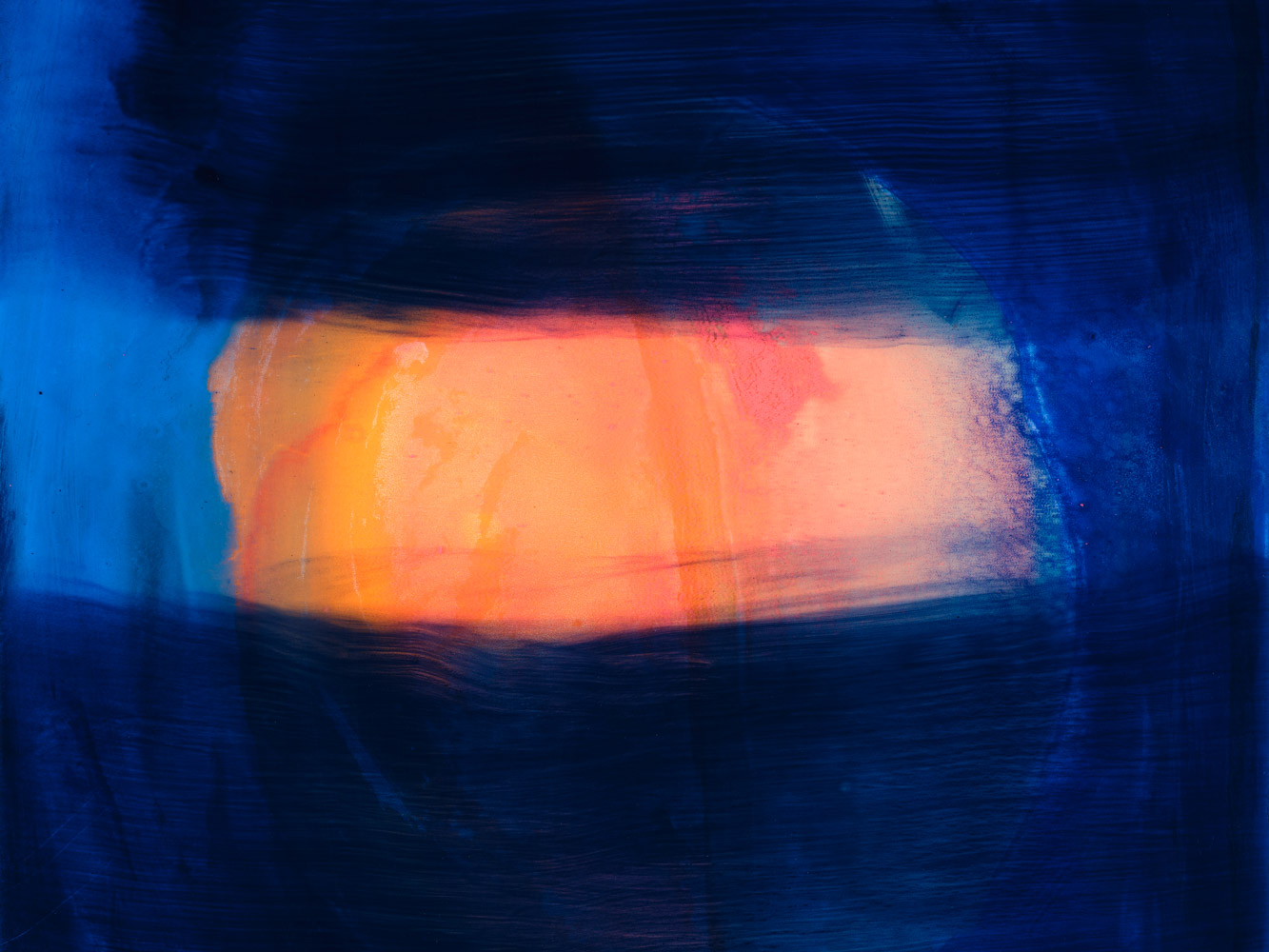









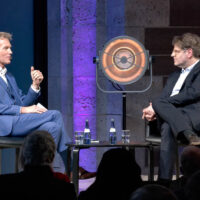
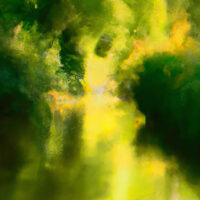

Thank-you, much appreciated …
I find the article by Mr Roh totally inadequate and therefore misleading. It leads this way then that but there is never clarity. Damaging to anyone wanting to find Truth.
Thank you Claus- Peter, this is a really helpful interview for me. It describes both the practical steps and the overall intentions of meditation.
It seems so easy to forget Steiner’s exercise about positivity and refraining from criticism. We have too much divisiveness in the world, to consider valuable to negatively criticize. The last thing we need, is divisiveness, in our society. We need unity and positive contributions; to help each other in our paths. It’s important to realize that Steiner said that if we dwell on criticism (without love), we need to leave a path of spiritual development for a future life; not this life. It’s so valid to remember how selfless the spiritual world is.
In my comment today, I was considering one of the comments given about the interview on meditation.